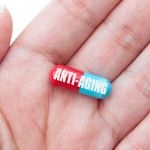By David Blyweiss, M.D., Advanced Natural Wellness
August 14, 2013
- Is inflammation making you old before your time?
- Top foods that age you more quickly
- 6 Tips for younger – and healthier! – skin, cells and organs
Most of my patients are pretty sure-footed when it comes to talking about things like high cholesterol, triglycerides and homocysteine. They all want to reduce their reduce risk of heart disease and understand the role of these contributing factors.
Many of them are also concerned about arthritis, diabetes, dementia and other age-related issues. But when it comes to understanding factors that contribute to all of these health threats, there is one chief factor most of them aren’t aware of.
You see, almost all of today’s major health concerns have one thing in common: Inflammation.
And I’m sad to say that the average American diet triggers the inflammation process.
You see, many of the foods we eat today – and the way we cook them – causes something called advanced glycation end products (often called AGES) to form in our bodies.
MD Exposes the Hidden Danger to Your Eyes

When your eyesight starts to fail, it's a real problem. Suddenly you can't go to the grocery store... you can't get to the doctor if you have an emergency... you can't meet your friends for dinner…
Your "regular" doctor doesn't have time to keep up with the latest research. And the same goes for eye doctors. They go to school to learn how to fit you for glasses and contacts, but have no way of preventing the damage and loss of eyesight that threatens your freedom and independence.
Let me show you something that explains a LOT about how your eyes work.
In my FREE Special Report, I'll show you a HUGE, untapped resource for your eyes that safely and naturally restores clear, effortless eyesight.
Click here to get started...
AGES are damaged molecules and sugars that bind to your cells. This creates an inflammatory response that’s associated with most of today’s top health concerns.
AGES are strongly linked to arterial stiffness and plaque build-up that are common in heart disease. AGES can also raise levels of C-reactive protein, which is a key marker for inflammation.
But it doesn’t stop there. They are also associated with diabetes, arthritis, Alzheimer’s disease, dementia, muscle-wasting and cataracts.
Fortunately there are ways to reduce, and even reverse, advanced glycation end products in your body. And when you do, it will slow down the aging process so you can remain healthier and active as you age.
Scientists have identified two primary sources of AGES. The first is they way we cook our meat products.
Meats high in fat and protein will form AGES when cooked at high temperatures. And that’s a real problem for people who add a lot of meat to their dinner plates. Especially since meats are often browned, grilled and charred at high temperatures to produce more flavor.
In fact, a few years ago researchers at the Mount Sinai School of Medicine analyzed the AGES content of 549 different foods. And it turned out meat was the biggest culprit when it came to the development of AGES.
Are You Suffering From...
- Love handles and a pot belly
- Romance that isn't what it used to
- Forgetfulness and inattention
- Low (or no) strength and endurance
- A sex drive that's shifted into neutral...or worse
If so...you may have Mature Male Burnout. Click here to discover more about this unique condition and what you can do about it.
In the meat category, beef contained the highest level of AGES, followed by poultry, pork and fish. Compared to other meats, lamb – my favorite type of meat – ranked relatively low.
Now you already know I recommend limiting the amount of meat you eat to about 13% of your diet. I also suggest choosing lean cuts of meat from grass-fed livestock and free-range poultry. The leaner the meat, the fewer by-products will be released when cooking.
When you do enjoy a lean cut of meat there is a way to cut your risk of inflammation. Steaming them at low heat can really cut the risk. Braising them in liquid or simmering them in a sauce can also help. I also like using a slow cooker or roasting at low temperatures.
And here’s a little trick that’s common in the Mediterranean and Asian diets. These cultures tend to marinate meat in acidic ingredients like lemon or vinegar. This tends to cut down on the formation of AGES when it comes time to cook the meat.
Another way AGES are formed in our bodies is when we eat too many high glycemic foods.
While high glycemic foods themselves aren’t high in AGES, they quickly convert to glucose in your blood. Problem is, your body can’t always convert those sugar molecules into something useful. And when blood sugars remain high for extended periods, AGES form in your body.
Sugary foods, in particular, will cause your blood sugar levels to spike. That includes both refined sugar and high fructose corn syrup. But sweets aren’t the only problem. Other “white” foods like bread, potatoes and pasta, also contribute to the formation of AGES.
This is especially true when it comes to people with type 2 diabetes. Inflammation is a common problem in diabetic patients. And AGES flourish in people with high blood sugar.
So steer clear of foods that that are high on the glycemic index. These foods will spike your blood sugar, which contributes to the formation of AGES in your body.
Here are several additional ways to reduce AGES…
- Add plenty of fruits and veggies to your diet. These natural foods are naturally low in AGES. Plus, they are loaded with antioxidants and other nutrients that can offset some of the damage caused by AGES.
- Carnosine is a safe, naturally occurring antioxidant that has been shown to inhibit to the formation of AGES. It’s believed to bind with AGES and remove them from your system, which also slows down the aging process. I suggest 500 mg twice a day.
- Aged garlic can also help prevent the formation of AGEs. This is due, in large part, to an enzyme called alliinase. This sulfur-rich substance is activated when the clove is crushed and allowed to sit for about 10 minutes. Try eating fresh garlic as often as possible. Or you can pick up an aged garlic supplement and take 900 mg. per day.
These are some pretty easy tips. And they’ll seem even easier when you start enjoying the way your body feels when it doesn’t have to fight off inflammation – and all of the chronic illnesses associated with it.
Resources:
Claudia Luevano-Contreras, et al. Dietary Advanced Glycation End Products and Aging. Nutrients. 2010 December; 2(12): 1247–1265.
Vlassara H, Cai W, et al. Protection against loss of innate defenses in adulthood by low glycation end product (AGE) intake: role of a new anti-inflammatory AGE receptor-1. J Clin Endocrinol Metab 2009;94:4483–4491
Reddy VP, et al. Carnosine: a versatile antioxidant and antiglycating agent. Sci Aging Knowledge Environ. 2005 May 4;2005(18):pe12.
Ahmad MS, et al. Aged garlic extract and S-allyl cysteine prevent formation of advanced glycation endproducts. Eur J Pharmacol. 2007 Apr 30;561(1-3):32-8






